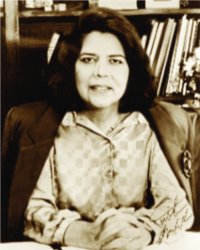Elizabeth Blackwell Award
WILMA MANKILLER

Wilma Mankiller's efforts on behalf of the Cherokee Nation have earned her worldwide prominence as a speaker, not only for her people, but for countless women s rights and minority organizations.
The seeds of Mankiller s commitment to Native American rights issues were probably planted in 1957 when she and her family were relocated from their home in rural Oklahoma to San Francisco by the Federal Bureau of Indian Affairs as part of the Bureau's effort to "solve the Indian problem." Nurtured by her activities in the Bay Area s Native American community, Mankiller returned to her ancestral home in 1977 to apply her knowledge of treaty rights, human services, and program development to her work for the Cherokee Nation. Proving herself first as a volunteer, she quickly rose through the ranks to the elected position of deputy chief in 1983. A two-year appointment as chief, following the 1985 resignation of Ross Swimmer, prepared her for a successful bid for the top slot in 1987, when she became the first woman elected to this role. She was re-elected to a second term as chief in 1991 with an impressive 83 percent of the vote. Although her term as principal chief ended in August, 1995, after she opted not to seek re-election, Mankiller continues her work on behalf of Native peoples.
Under her administration the Cherokee Nation saw dramatic gains in revenue, services, and stature. Mankiller is particularly proud of the development of a comprehensive health care system for her people.
Inducted into the National Women's Hall of Fame in 1993, Mankiller has received numerous other honors and awards, including honorary degrees from seven universities. She also serves on the boards of directors of several national organizations.
